- Welcome
- Noir Zine
- Allan Guthrie
- Books
"...those who enjoy the darker side of the genre are in for some serious thrills with this..."
Laura Wilson, The Guardian

Published in the UK by Polygon (March 19th, '09) and in the US by Houghton Mifflin Harcourt (Nov '09).
Christa Faust
interviewed by Damien Seaman
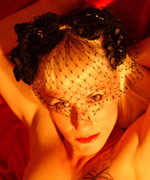 Christa Faust likes to put the hard into hard-boiled. Her latest book, Money Shot is due out from Hard Case Crime at the end of January. In Christa’s own words, the novel is ‘a pulpy little revenge story involving a former porn star, a briefcase full of money and the international sex slave racket’. So I guess the title is a play on words, right? Right?
Christa Faust likes to put the hard into hard-boiled. Her latest book, Money Shot is due out from Hard Case Crime at the end of January. In Christa’s own words, the novel is ‘a pulpy little revenge story involving a former porn star, a briefcase full of money and the international sex slave racket’. So I guess the title is a play on words, right? Right?
Oh, please yourselves.
Damien Seaman: How do you feel about being the first woman to be picked up by Hard Case Crime? Why do you think it took them so long to sign a woman?
Christa Faust: It feels fantastic. Honestly, I was thrilled to be picked up at all, as a writer of any gender. Hard Case publishes some of my favourite authors. Writers like Richard S. Prather and Westlake/Stark are my personal pulp heroes. It seems unreal to be on the same shelf with guys like that.
I can’t speak for Ardai [Hard Case editor], so I honestly don’t know why it took him so long to publish a female author. I suspect it’s simply because he didn’t get any submissions that he liked from women. After all, why should he lower his standards just to round out the gender mix? I certainly wouldn’t want to be published just because I happen to have tits. My book was judged as strictly as any other in the line up and I’m still amazed, thrilled and proud to have made the cut.
DS: Traditionally, female noir or hard-boiled authors have been thin on the ground. Why do you think that is?
CF: Actually, I recently met Thrilling Detective’s Kevin Burton Smith for the first time and he was talking about a new project he’s been working on that involves uncovering the identities of female pulp writers who used male pseudonyms. There aren’t a lot, but there are more than you’d think. I’m sure there were also plenty of men who wrote for the romance pulps using female names. Gender roles were more limited back then and I’ll bet there was a level of expectation on the part of the readers as well. A guy who just got home from the war isn’t gonna want to read war stories written by some dame who wasn’t there and in his mind couldn’t possibly relate to what he’d been through. Pulp writers wrote to pay the bills and there wasn’t much point writing stuff you couldn’t sell.
DS: Why do you think there are now more women noir authors than ever before?
I think more women are writing noir and hardboiled fiction now simply because they can.
DS: How did you get the deal with Hard Case Crime?
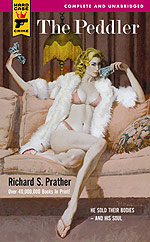 CF: I was very excited about Hard Case’s reissue of Prather’s The Peddler so I posted about it on my blog. A friend of mine posted a response, asking why I hadn’t submitted to Hard Case, since she thought I’d be perfect for them. Editor Charles Ardai responded saying that he would love a submission from me. Needless to say, I submitted. The rest is history.
CF: I was very excited about Hard Case’s reissue of Prather’s The Peddler so I posted about it on my blog. A friend of mine posted a response, asking why I hadn’t submitted to Hard Case, since she thought I’d be perfect for them. Editor Charles Ardai responded saying that he would love a submission from me. Needless to say, I submitted. The rest is history.
DS: Money Shot’s protagonist, Angel Dare is pretty bad-ass. Is she the ultimate femme fatale?
CF: I don’t see Angel as a femme fatale at all. A femme fatale is traditionally a villain and Angel has a lot more in common with the male heroes of hardboiled pulp than she does with the evil scheming vixens that lead them astray. Also, Angel may be tough, but it was important to me to make her a believable and realistic character. I did not want her to be one of these Ultraviolet-style supermodel superheroes who can fight six men at once without breaking a nail. Angel has to use her brains, guts and determination to make up for what she lacks in physical strength. She is never really sure if she’ll be able to get it up to do what has to be done until the very last second.
DS: The book touches on porn and sex slavery. Does the exploitation of women for sex make you angry?
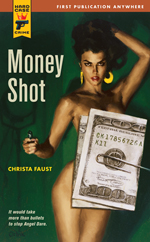 CF: I don’t like to see anyone exploited for any reason, but I don’t see porn and sexual slavery as equal in that regard. The adult film industry is a business like any other and the men and women who choose to participate are doing so with full knowledge and consent. Sexual slavery of the sort that Angel encounters in Money Shot is both illegal and despicable, a total violation of the most basic human rights.
CF: I don’t like to see anyone exploited for any reason, but I don’t see porn and sexual slavery as equal in that regard. The adult film industry is a business like any other and the men and women who choose to participate are doing so with full knowledge and consent. Sexual slavery of the sort that Angel encounters in Money Shot is both illegal and despicable, a total violation of the most basic human rights.
DS: There are some pretty juicy acts of revenge in the book. Are you acting out any personal revenge fantasies here?
CF: Luckily, I’ve never had anything happen in my life that would inspire a 44 calibre vendetta.
DS: Why do you write? Is writing a form of addiction for you?
CF: I do love to write, but I wouldn’t call it an addiction. On the other hand, I have been doing it for as long as I can remember and don’t plan to stop any time soon. It’s pretty much the only job I’m really good at.
DS: Do you write full time? How do you manage that?
CF: I do write full time. When I’m on a heavy deadline, like with one of my tie-in gigs, I usually do two sessions a day. I get up in the morning and do about two thousand words, then I go out and do errands, walk the dogs, go to the gym, that sort of thing. Anything that gets me out of the house and away from my desk. When I get back in I do another two thousand words and then call it a night. I try to take two days off per week, but I’ve been known to work seven days when the deadlines get really hairy. When I’m working on the "real" stuff, that is to say my own personal projects, I tend to be slower, rarely doing more than two thousand words a day. The day-job writing buys me time off to do the personal stuff.
DS: You’ve also written lots of novelizations of films, ie Snakes on a Plane. What’s the difference between writing your own novels and writing novelizations?
CF: Novelization work is a lot like lifting weights. Weightlifting can be boring and repetitive, but it builds up the muscles you’ll need when you box, wrestle or play basketball. I find that the novelization work builds up my writing chops and keeps them sharp so that when it comes time to use those chops on something closer to my heart, I can rely on them to make the work flow more smoothly.
DS: I get the impression from Money Shot that you were raised a Catholic. Is that the case and, if so, how has that influenced your work?
CF: I’m very flattered and will take that as the ultimate compliment for a writer. I was not raised Catholic, but clearly I did a good job getting into the mindset of someone who was. Another interviewer recently asked me if I grew up on the South Side of Chicago, because the interviewer herself had grown up there and said that Angel’s recollections of her childhood on the South Side seemed so authentic. I grew up in New York City. That really put a smile on my face.
DS: The Money Shot blurb says you’ve been a filmmaker, a model and a Times Square peepshow girl. Can you tell us a little about these jobs and how they influenced your writing or your worldview?
CF: I worked the peep booths for a few years in the late eighties. This was back when Times Square was still known as "The Deuce," before Disney and Starbucks castrated it and transformed it into the Mall of America.
The peep shows were a real goldmine of fascinating characters and story material. For those who don’t remember the days of live peep booths, they worked like this: There were two doors and the booth was divided into two sides with a shuttered glass window between them. You went in the customer’s side, put tokens into the machine and the shutter went up so you could see the girl on the other side. There was a prison-type phone rig so you could to talk to her. It was basically like phone sex with live visuals.
That was a time in my life when I was just discovering my own kinky sexuality and so needless to say I got a ton of fetish requests. So many in fact that I decided to quit the peep racket and go to work as a pro Domme. I worked at various dungeons in New York City, including the famous Vault, and then continued to work both in dungeons and as an independent Domme out here in Los Angeles. L.A. being the adult film capital of the known universe, I started doing fetish videos and modelling as well. It was so much fun that I wanted to try calling the shots behind the camera. I made the now famous cult serial bondage adventure Dita in Distress starring burlesque pin-up goddess Dita Von Teese. Making that serial was an adventure of its own. We had a very low budget and did everything ourselves, sets, costumes, props, effects, everything. I had a fantastic, creative and tireless crew and really learned a lot about how to make something out of nothing.
I think anything a writer does influences their writing, whether they work on a farm or on Wall Street. I think my various non-writing gigs have influenced me most by giving me insight into human nature and sexuality.
DS: What was the thinking behind the trailer you’ve put together for Money Shot?
CF: So many of the book trailers I’d seen were very static, using primarily still photos and text. I had experience shooting low or no budget video and I wanted to create something a little more dynamic. I didn’t want to simply make a film version of the book and have actors act out a scene exactly as written. I wanted to create something more like a music video, a teaser that gave the flavour and feeling of the novel without being too literal.
DS: You’re a fan of Ray Banks. What is it about his books that you so admire?
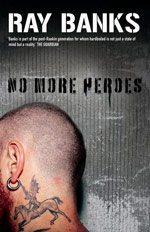 CF: I was turned on to Banks when I stumbled across this short story called 'The Last Kayfabe'.
CF: I was turned on to Banks when I stumbled across this short story called 'The Last Kayfabe'.
Being a wrestling fan, that title caught my eye, and I was instantly hooked. Banks’ Cal Innes novels were initially a tough nut for me to crack, because of the unfamiliar (to me) colloquial slang. But once I got the hang of his uniquely British voices, he really won me over with his ballsy, no-holds-barred prose, wry black humour and insightful take on the darker side of human nature.
DS: Which other writers do you like? Who are the up and comers you see shaping the genre for the future?
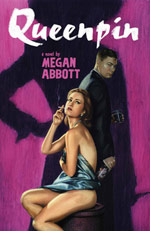 CF: I’m also a fan of Megan Abbott. I think she’s a real contender. She can go toe to toe with the toughest male writers but she also brings this powerful and uniquely female sensibility to the genre. She’s so good it’s scary. Another writer I see stirring things up in the genre is fellow Angelino Gary Phillips. His novel The Jook is classic old school noir on steroids. Real addictive stuff.
CF: I’m also a fan of Megan Abbott. I think she’s a real contender. She can go toe to toe with the toughest male writers but she also brings this powerful and uniquely female sensibility to the genre. She’s so good it’s scary. Another writer I see stirring things up in the genre is fellow Angelino Gary Phillips. His novel The Jook is classic old school noir on steroids. Real addictive stuff.
You’re having a joint book launch party in February with ‘cozy’ author Sue Ann Jaffarian. This might surprise some people, as your styles are pretty divergent. How do you feel about the sometimes fundamentalist approach to subgenre in crime writing? Are there any kinds of crime or mystery fiction you refuse to read on principle?
What can I say? I like to shake things up. People were really shocked by my decision to sign with Sue Ann. It was as if I had announced that I was planning to take a black girl to the prom in Mississippi in 1952. People are so passionately divided on the noir vs. cozy business and I think it’s laughably narrow-minded. Just because you don’t like to read explicit violence doesn’t mean it’s wrong for others to write about it. Just because you think a novel where no one swears is unrealistic doesn’t mean others shouldn’t be allowed to write that way if they choose. Having been active in the fetish scene for nearly twenty years, I have a very tolerant view towards other people’s passions. So long as all the participants are consenting adults, I see nothing wrong with people enjoying whatever it is that gets them off. For example, I really dislike adult baby play. Diapers and bottles and all that. I don’t like small babies and have even less interest in the big ones. However, I would never say that adult baby fetishists are wrong and bad just because I don’t enjoy their particular fetish. Yet both noir and cozy hardliners love to try and invalidate each other and claim that only their way is good and real. Give me a break. It’s your prerogative to write any way you like and it’s my prerogative not to read it if I don’t like it.
I can’t say I would refuse to read anything on principle, but there are certain subgenres that I don’t generally care for. That doesn’t mean that I would never make an exception if someone whose taste I trust suggested I check something out. I like to keep an open mind.
DS: What advice would you give to writers wanting to emulate your success or career path?
CF: You can’t create the kind of lucky breaks I’ve had through sheer force of will. All you can do is be ready to take advantage of them when they come. The invitation to submit to Hard Case Crime would have been useless if I didn’t have something worth submitting. So write all the time and keep your chops sharp. If something doesn’t sell, write something else. Keep at it until the process feels as natural as breathing. That way, when you finally get the chance to throw that knockout punch, you’ll be ready.
DS: Who are your favourite icons of noir, and why? Who would win in a fight between Sterling Hayden and Robert Mitchum?
CF: Hayden, hands down! I love Sterling Hayden and The Killing is one of my favourite films. Mitchum was always a little too much of a laidback hop-head for my taste. He’s probably a better actor than Hayden, who admittedly can be pretty wooden at times, but Hayden comes off as much tougher in my book. Either way, I’d pay for ringside seats to that fight.
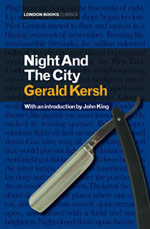 As for other noir icons, I have to go with Richard Widmark. Night and the City is another all time favourite, if not number one then at least in the top three. I also loved Widmark in Pickup on South Street. He personifies the Film Noir anti-hero so perfectly in those two films.
As for other noir icons, I have to go with Richard Widmark. Night and the City is another all time favourite, if not number one then at least in the top three. I also loved Widmark in Pickup on South Street. He personifies the Film Noir anti-hero so perfectly in those two films.
On the female side you can’t beat statuesque brunette bombshell Marie Winsdor. Even with that awful blonde wig in The Killing, she is absolutely mesmerizing. I also like Gloria Graham, Ann Savage and of course, Barbara Stanwyck, who also found a way to be unforgettable in a bad blonde wig and who I’d want to play me in the time-travel Film Noir version of my life.
###
Copyright © Noir Originals, 2008

Contact Damien
